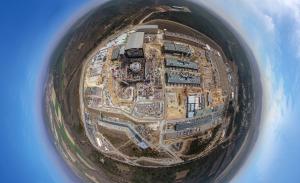Stakeholders
ITER's biggest partner pledges full support
14 May 2018
-
Laban Coblentz, Head of Communication
Earlier this month, the ITER Project received a giant boost from its largest partner and host member, the European Union (EU). On 2 May, the European Commission issued its budget proposal for 2021-2027, referred to as the "Multiannual Financial Framework". The proposal gives ITER its unequivocal support, both in the commitment of EUR 6.07 billion over the next seven-year budget cycle, and in the supporting narrative.
As host Member Europe contributes 45.6 percent of the total construction budget. This includes contributions to ITER systems and components, and all the buildings of the scientific installation. Photo: ITER Organization/EJF Riche
The key sentence is relatively simple: "The EU budget will ... continue to fund Europe's contribution to the development of the ... ITER project to develop a viable source of safe and environmentally friendly energy for the future." But reading through the full document (see the Communication here, and the Annex here), three additional aspects of the proposal are especially striking.
First, the Commission considers ITER to be on track for success. In some ways, this could be anticipated based on the April 2017 endorsement by the European Commission's Energy Directorate, and more recently by the April 2018 statement issued by the Council of Ministers. But to see the endorsement of the full budget, in black-and-white, is still more reassuring.
Second, the Commission considers ITER to be a sound investment. In the Annex, the following quote appears regarding ITER:
Achieving and exploiting fusion is a long-term objective, but the project is already bringing important benefits to the EU industry and research in the procurement and construction phases. More than three hundreds companies—including small businesses—from 20 Member States and Switzerland, and around sixty research organisations are engaged in cutting-edge research and innovation to provide components, offering them a chance to develop spin-off products in other sectors (energy, medical, aviation, high-tech). (Page 6)
And later:
The programme not only contributes to achieving a resilient Energy Union with a forward looking climate policy. It also fosters job creation and growth by offering European high-tech industries and small companies a valuable opportunity to innovate and develop products outside fusion. (Page 6)
Third, the Commission sees ITER as dovetailing nicely with the EU's overall research and innovation outlook. The ITER Project is placed under the same budget category as the EU's flagship program, "Horizon Europe"—under which an even EUR 100 billion is centred on three pillars: Open Science, Global Challenges and Industrial Competitiveness, and Open Innovation. While ITER is a separate budget line, the proposal articulates how ITER is complementary to and synergistic with these goals.
Now that the Commission has proposed the Multiannual Financial Framework for 2021-2027, the European Council and the European Parliament will have time for debate. The timeline for those discussions can vary; there is no clear final deadline for the budget decision. But since Europe is both ITER's host and its biggest partner, contributing 45 percent of the project's funding, the Commission's proposal as issued represents the strongest endorsement of ITER to date.


